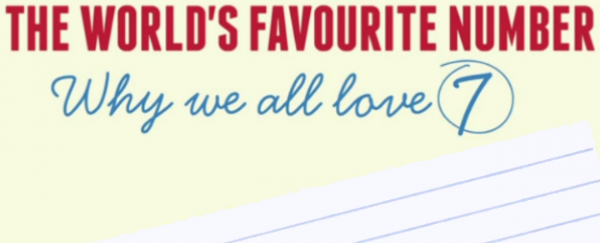
"We've been obsessed with seven for as long as we know," says UK-based author and science blogger, Alex Bellos. If you go back to one of the earliest writing systems we know about - cuneiform scrawlings on clay tablets that were used by the Babylonians to facilitate trade in Mesopotamia 5,000 years ago - you'll see that they're covered in sevens. It's mentioned 735 times in the Bible - 54 times in the book of Revelation alone, and then we've got seven brides, seven sages, seven days, seven seas, seven sins, seven sisters, seven wonders, seven dwarves, and the Seven Gods. George Costanza. What's going on here?
Bellos recently surveyed over 40,000 people around the world, asking them what their favourite number was in an effort to research what our emotional connection could be to certain numbers. Seven came out as the favourite, followed by three, then eight, then four. What's so special about seven?
One compelling theory, says Bellos, is that seven is the only number that you can count on your hand (eg. one through 10) that cannot be divided or multiplied within the group. "It's unique, it's a loner, and humans interpret this mathematical property in cultural ways," Bellos hypothesises in the video above. "By associating seven with a group of things, you kind of make those things special too."
Over at The Guardian, Bellos breaks down the other findings:
- 1,123 individual numbers were nominated from 30,025 submissions.
- Almost half of the submissions were for the numbers between 1 and 10.
- Every number between 1 and 100 was chosen.
- 472 numbers between 1 and 1000 were chosen.
- The lowest whole number that received nil points was 110.
- If we had to nominate a "least favourite number" – 110 wins that gong.
He reports that numbers ending in zero are :particularly unloved", as are numbers ending in five, except for the number five itself, which did pretty well at an overall ranking of… you guessed it - five.
Bellos argues that, similar to how we unconsciously side with seven because humans are drawn to things that are special and unique, numbers ending in zero are shunned, because we associate them with approximations. And approximations are far too common and vague to convince us to form an emotional connection with them.
Watch the video above, and head to Bellos's website to see the full results.
Sources: Bloomsbury Publishing, The Guardian
